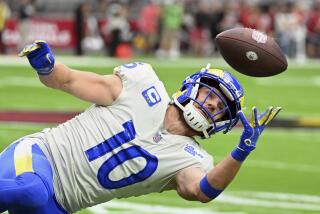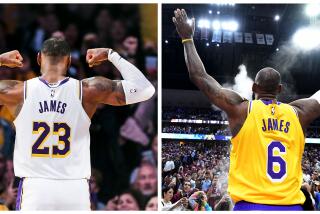Yes, but Does This Explain the Wave?
- Share via
Cincinnati Reds fanatics and slews of others who carry their brooms into stadiums and chant “Sweeeeeeeep” can thank David Millie of Oceano, Calif., for tracing at least one historical precedent for their madness.
Millie, well-read in naval history, came across a reference to 17th-Century Dutch Admiral Martin Tromp in “An Illustrated History of Ships,” edited by E.L. Cornwell.
From the text: “(Tromp) escorted a big convoy, outward bound, into the Strait of Dover with 80 warships. (British General and Admiral) Robert Blake had half that number and a large proportion were only armed merchantmen. The battle, fought in November, 1652, known as the Battle of the Ness, or Dungeness, left Tromp, so it was said, hoisting a broom at his masthead to announce that he had swept the Channel clear.”
Trivia time: Name the only man who neither played nor managed in the major leagues to have a uniform number retired in his honor.
Coach’s pet: From Dave Anderson of the New York Times, quoting Notre Dame Coach Lou Holtz in a recent column on running back Raghib (Rocket) Ismail:
“He’s a football player with track speed. But he’s not just fast. He’s got unbelievable body control and a linebacker mentality. He doesn’t seem to understand that he’s only 5-10 and 175; he plays like he’s 6-2 and 210. He’s like the Pekingese that’s barking at the German shepherd.”
A familiar chase: From Associated Press: “Lyle Wildgoose scored a hat trick to lead the Providence College Friars to an 8-3 win over the University of Ottawa in the U.S. Air Hockey Classic Friday.”
Collision course: Australia’s Darren Clark, fourth in the 400 meters at both the Los Angeles and Seoul Olympics and the 1990 British Commonwealth champion, quit track and field in late October.
Clark, 25, who will play professional rugby in Sydney, didn’t rule out returning as a 200-meter man in the 1992 Games in Barcelona. But in an interview with James Christie of the Toronto Globe and Mail, Clark called his old sport “a futile pursuit” because of drug use.
Said Clark: “It’s like running into a brick wall and I don’t see any point in doing that anymore. It’s been proven that four or five of my competitors were taking drugs, including the one, American Antonio McKay, who beat me for the bronze medal at the 1984 Olympics.
“There are still guys out there cheating the system.”
Add Clark: Christie noted that McKay was caught last spring, not in 1984, for using the cold preparation phenylpropanolamine. He also ran a rebuttal by Canada’s Anton Skerritt, one of Clark’s main rivals.
Skerritt told Christie: “People in the sport saw him run 44.71 as an 18-year-old in his first Olympics. They suspected him (of drug use). . . .
“The money in track and field was drying up as it was, but for a guy who’s ranked fourth in the world to come out and suggest drugs are still rampant. . . . If he’s concerned about cleaning up track, there are other ways to go about it.”
Trivia answer: Angel owner Gene Autry, whose players and employees retired No. 26 in his honor in 1982.
Quotebook: Liberty University Coach Sam Rutigliano, on his team’s struggling offense: “It reminded me of the tango. One, two, three, kick.”
More to Read
Go beyond the scoreboard
Get the latest on L.A.'s teams in the daily Sports Report newsletter.
You may occasionally receive promotional content from the Los Angeles Times.










